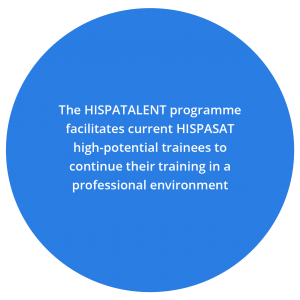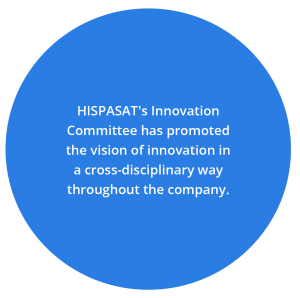TRAINING
As in all organisations, HISPASAT operates in a complex and ambiguous world, where continuous change gives companies practically no time to react to new circumstances. All of these changes require more flexible companies, which essentially means organisations that are made up of people who are capable of working in new and uncertain environments, new markets, more demanding customers, new cultures and languages; creative and collaborative people who do things differently and more efficiently, taking on new tasks and responsibilities. New technologies, the challenges arising from competitive markets and organisational changes are some of the factors that require continuous staff training.
Under this perspective, during the 2016 business year, HISPASAT made progress in its training plans with the aim of ensuring that their human capital was prepared to meet the growing demands the company faces in order to develop, grow and become more competitive in markets. Thus, HISPASAT continued with the activities included in the Training Plan established for the period of 2013-2016 focused on adapting to change and flexibility as necessary professional skills for employees to be able to respond to change with agility, to adequately handle multiple demands, easily reorganise priorities and adapt to the changing circumstances surrounding HISPASAT. Along with this training, HISPASAT provided its employees with specific online training through the HISPASAT Campus in important areas of interest for the organisation, such as languages and technical courses for an efficient management of the activities related to the different work positions.
Training activities were completed with the design of a new Training Plan for the 2017-2019 period, taking into consideration the needs for improving skills the organisation considers essential in the medium and long term.

HISPATALENT
During the 2016 business year, and as part of the commitment to developing talent, HISPASAT launched a new programme called “HISPATALENT”, focused on providing current HISPASAT high-potential trainees with opportunities to continue their training in a professional environment composed of talented professionals from the company’s different departments.
Through agreements signed directly between HISPASAT and sizeable group of Spanish universities, the programme includes a rst year in which their scholarship activity at HISPASAT is combined with their university training through a course designed together with the Universidad Alfonso X El Sabio. This course consists of compulsory and free elective subjects for people participating in the programme and associated with the activities developed by HISPASAT. Once this training has been completed, the people included in the HISPATALENT programme may opt for a contract as an intern within the company, focused on integrating young talent into the organisation.

FLEXIBILITY AND BALANCE
At HISPASAT we understand exibility as the ability to adapt working conditions to meet professional needs in order to achieve a better balance between work and personal life, whenever it is objectively possible and compatible with service and business needs.
Accordingly, in the 2016 business year the company agreed to launch several initiatives in light of the results of the latest Work Climate Survey, through which it seeks to promote a exible working environment, work-life balance as well as an improvement in the wellbeing of its employees. HISPASAT has thus incorporated to already existing measures, a package of four new initiatives aimed at:
• Reconciling work and family life by allowing employees to share more time with their families.
• Increasing employees’ involvement in the e ciency of their professional activities, improving issues such as agility in decision-making processes, guidance and focus on activities to be performed, thereby achieving improvement in productivity.
• Rationalising working schedules and facilitating the involvement of both spouses in their children’s education.
The exibility measures implemented by HISPASAT are sustained by six basic principles:
• Responsibility. Flexibility provides a series of bene ts, which allows for increased and improved reconciliation. It is a way of corresponding to employees’ dedication and commitment, but, in turn, it also requires responsibility by both parts in order to be viable.
• Customisation. Aligned with the guidelines the company will agree to, there will
be diverse exibility options. In this context, in compliance with the requirements established in each case and respecting the needs of the organisation, each professional will be able to select the options that best adapt to their reality (business needs/demands, etc.).
• Subordination. In case a con ict arises between the proposed initiatives and regulatory aspects, the latter shall have priority over the former.
• Coordination. Flexibility and its management within the working teams is the responsibility of each branch of management. Managers, as part of HISPASAT’s management team, are ultimately responsible for compliance with these basic principles, listening to their team’s needs, coordinating the implementation of these principles and making sure they are responsibly met.
• Reversibility. The exibility measures that may be implemented do not constitute consolidated rights, but rather are reversible at any moment and subject to e cient and adequate compliance with the company’s objectives and results.
• Accessibility. Employees may request any exibility measure without detriment or penalty as a result thereof.

Timetable flexibility for split shifts
In accordance with this initiative, HISPASAT has modi ed the work entry and exit times so that professionals have a flexible time band in this sense based on personal and business needs, as long as the number of working hours for each shift is met.
Implementation of Smart Days
Flexibility must not only be understood in relation to how working shifts are organised, but also with regard to where the work is performed. Therefore, the company’s employees can have up to two days a month in which, through prior notice and internal management, they may work from a different location from that of their job position.
Efficient travel management
As part of the launched initiatives, HISPASAT considers it important to reduce the number of journeys between the homes of professionals and their workplace. With this in mind, employees at HISPASAT who are traveling on business will, on that day and if they so deem, be able to begin their work shift in a different location from that of their job position and from said location they may go directly to the station or airport, without having to do so from their workplace.
Corporate wellness – healthy lifestyle
Corporate wellness has been one of the most successful tools used in recent years for improving work efficiency (the ability to be able to make complicated decisions, to be more creative, more focused and have greater resistance to stress). Therefore, HISPASAT has completed the previous measures with the organisation ́s commitment to ensure that employees adopt positive preventive habits. According to this concern, HISPASAT has launched different initiatives aimed at promoting and incorporating healthy lifestyle habits, through which employees may improve their wellbeing, based on six main pillars, such as a healthy diet, physical activity, stress management and wellbeing.

SAFETY AND PREVENTION
Within the areas of work associated with safety and prevention and the health of its employees, HISPASAT considers it essential to work towards minimising the impact of possible trafic accidents on the way to work or during business related activities. In line with this vision, and aware of the risks of work-related trafic accidents, this year HISPASAT has developed its own Mobility Plan as a means for reducing such accidents. The Mobility Plan is therefore one of the company’s tools for reducing the accidents that take place to or from work or in journeys made during the development of work, and which have repercussions on the health of its employees, understanding health as complete physical, mental and social wellbeing and not merely the absence of injury or illness.
In accordance with these principles, HISPASAT created its rst Mobility and Tra c Safety Plan in 2016, the primary objective of which was to ensure the wellbeing, safety and health of its employees by means of information on practices and conduct aimed at reducing work-related tra c accidents, either to or from work or during business activities. Furthermore, through the elaboration of this plan, HISPASAT seeks to:
• Reduce or mitigate the risks related to commuting (home/work/home) and the journeys during the working day (at the workplace or during business activities). • Encourage collective public transport whenever possible.
• Facilitate the recovery of safe spaces and favour the reduction of Co2 emissions to the atmosphere
TRANSVERSAL INNOVATION
The sector of satellite communications operators was historically marked by a certain level of stability. High capital needs, specific know-how and a particular regulatory context acted as entry barriers for new players. In this context, innovation in the sector mainly arose from efforts in technological R&D of leading satellite and ground segment equipment manufacturers.
Recent years have been marked by the appearance of new entrants into the satellite industry. New players have begun to manufacture small and relatively cheap satellites that aim to compete with the current satellites; satellite launchers are racing to reduce the costs of access to space; the sector has also caught the interest of large multinational companies including Google and Facebook, which have announced their goal to “connect the unconnected”, and they are providing more flexible models of innovation that have greater risk tolerance.
Furthermore, the telecommunications sector in its broadest sense is also undergoing change: mobile operators are leading the development of the new generation of wireless communications, 5G, which promises faster, more reliable, ubiquitous connectivity for millions of devices, and in which satellites will play a fundamental role, being smoothly integrated into the rest of the networks.
In this increasingly complex competitive environment, innovation activities, which have always received special attention in the company, have become fundamentally relevant, since innovation alone can help us properly respond to the changes and new demands arising in the market.
HISPASAT’s vision is that innovation should be produced transversely, taking into account professionals of all its areas, who are true keepers of the company’s know-how, as well as other industry partners (satellite and ground segment equipment manufacturers, integrators of telecommunications services, etc.).
From this perspective, and to strengthen the innovative activity in the company, HISPASAT created the Innovation Committee in 2016. This committee, formed by members of the divisions of Strategy and Business Development, Economy and Finance, Business and Technology and Operations, coordinates the overall innovation strategy, which is currently de ned along two main lines: the design of innovative satellite services that allow HISPASAT to defend its position in its
key verticals and differentiate it from its competitors; and the analysis of the potential use of new innovative infrastructure (such as LEO satellites or high altitude platform systems (HAPS)) that may complement the current HISPASAT feet in the future.



